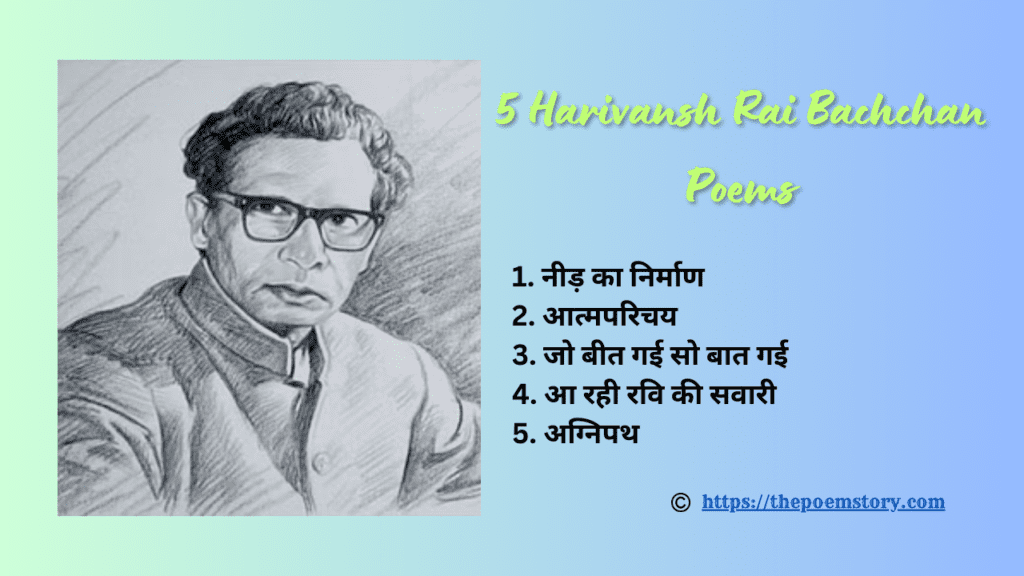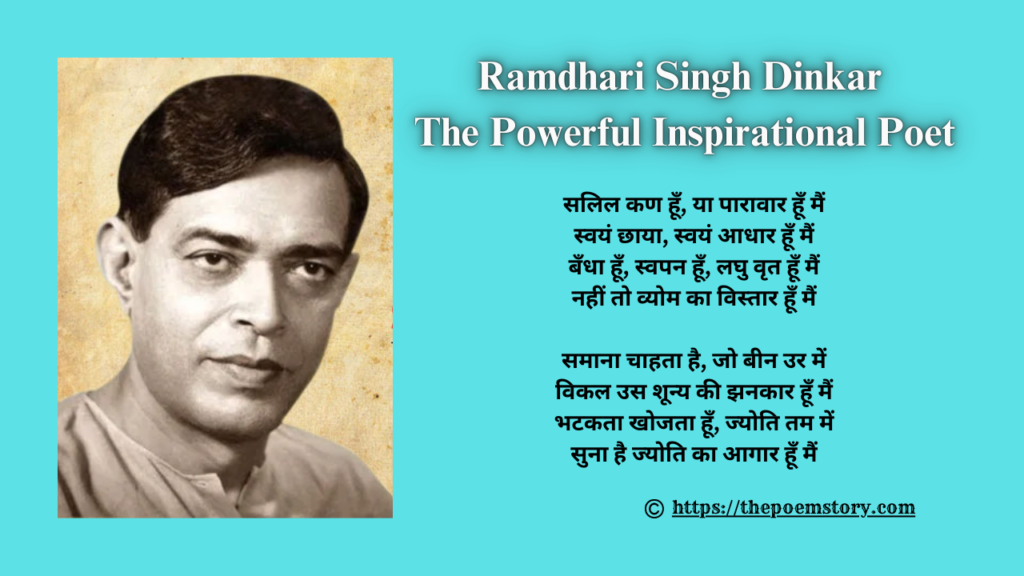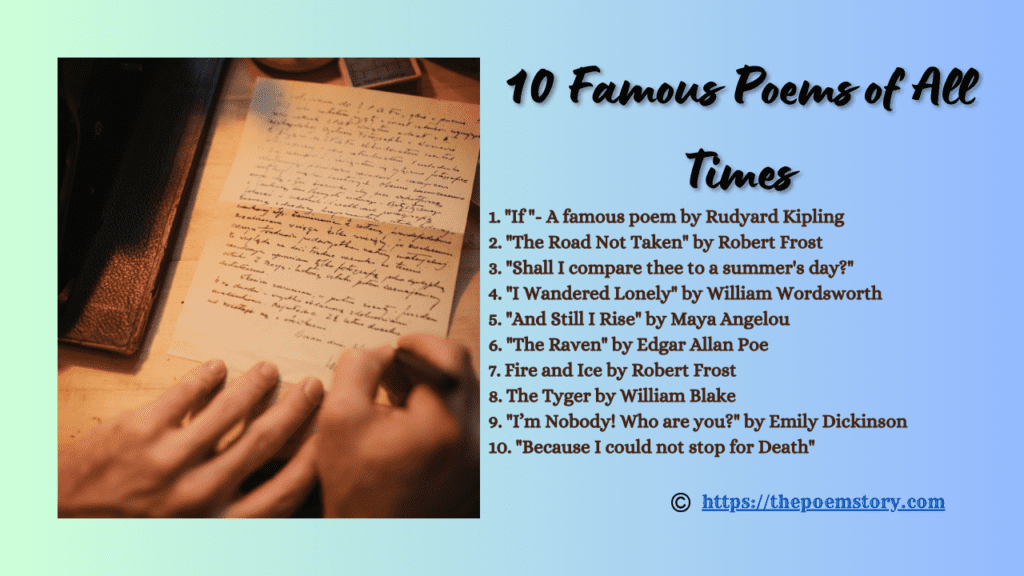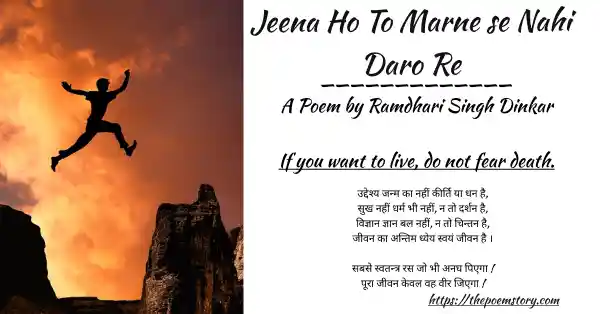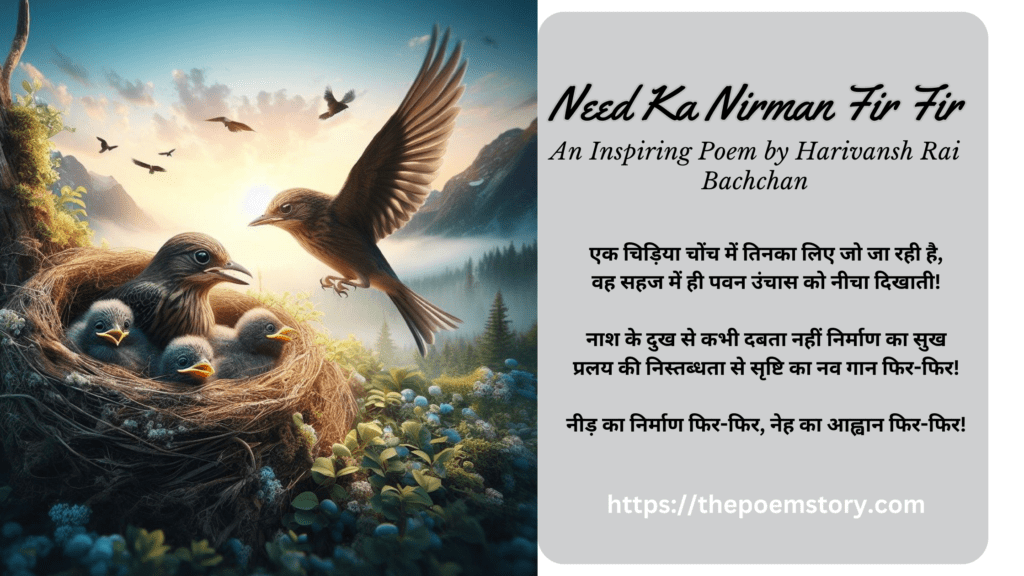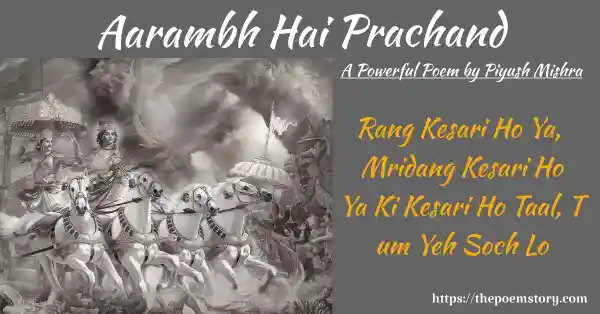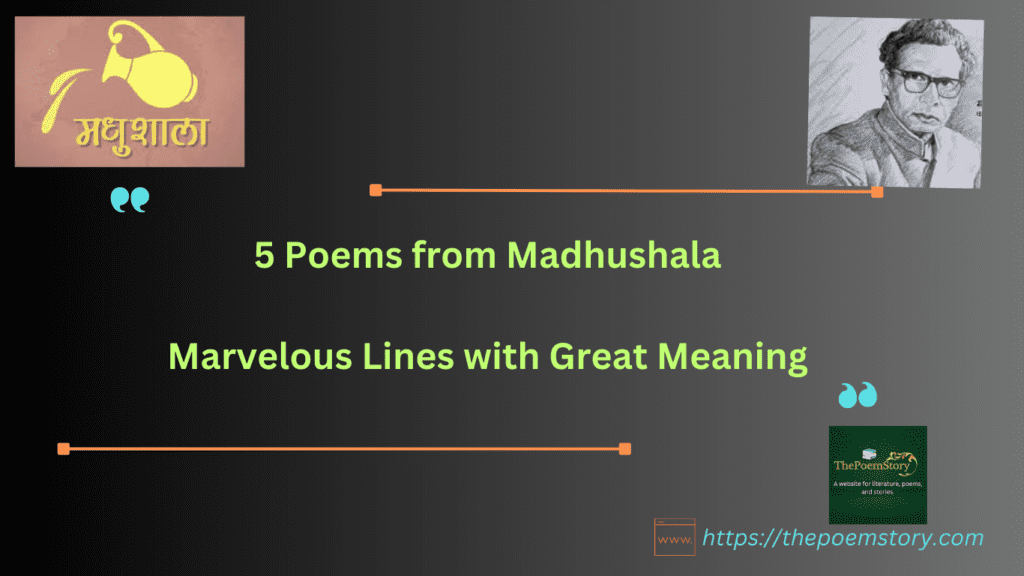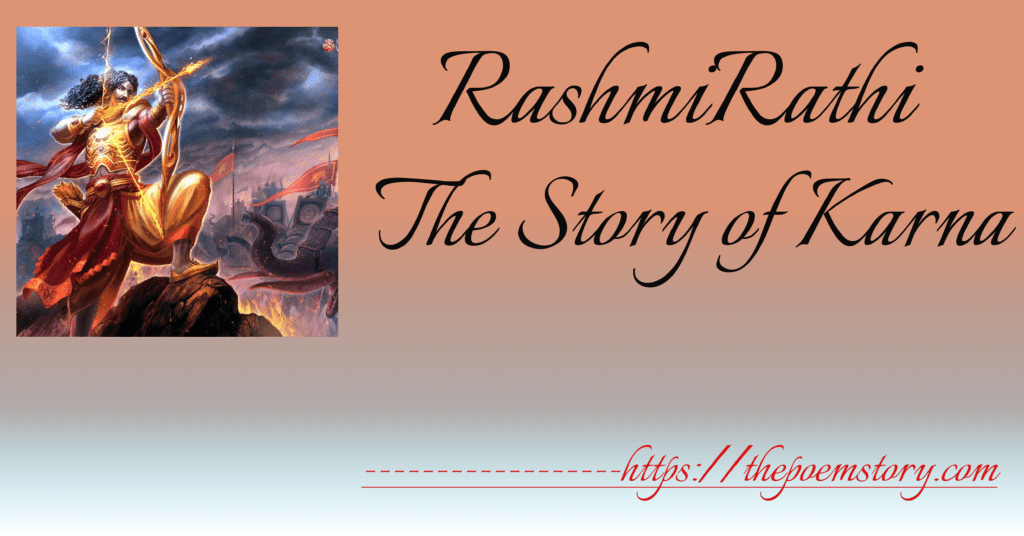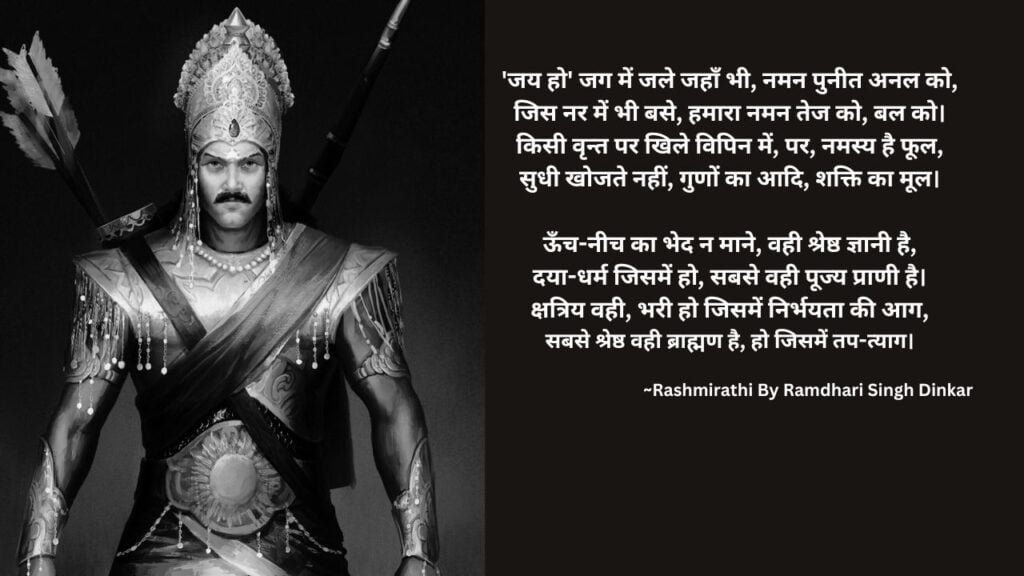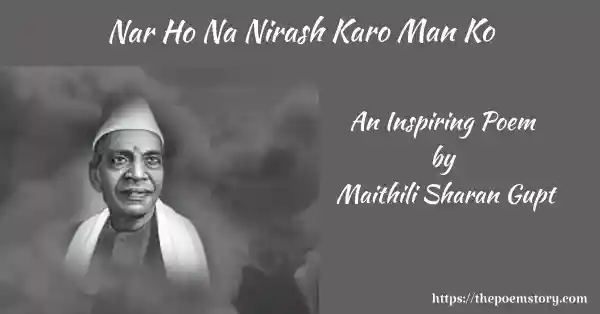Introduction
Manushyata Poem was written by Maithili Sharan Gupt and in my view it is a strong motivation for Universal Brotherhood. The famous lines “Wahi Manushya Hai Ke Jo Manushya Ke Liye mare” guide us to our moral duty towards humanity. In this post, we write the Manushyata poem lyrics and the Manushyata poem explanation. The poem “Wahi Manushya Hai Ke jo” is in the 10th Grade of the Indian curriculum. I have seen many posts that tell you the answer for examination purposes and students benefit from them. However, in this post “Manushyata Poem Explanation” we provide you with a deep insight into the poem.
[Also Read: Nar Ho Na Nirash Karo Man Ko]
Table of Contents
Manushyata Poem Lyrics
Manushyata Poem Lyrics in English | Manushyata Poem Lyrics in English
विचार लो कि मर्त्य हो न मृत्यु से डरो कभी,
~Maithili Sharan Gupt
मरो परंतु यों मरो कि याद जो करें सभी।
हुई न यों सुमृत्यु तो वृथा मरे, वृथा जिए,
मरा नहीं वही कि जो जिया न आपके लिए।
वही पशु-प्रवृत्ति है कि आप आप ही चरे,
वही मनुष्य है कि जो मनुष्य के लिए मरे॥
vichar lo ki martya ho na mrityu se daro kabhi,
maro parantu yon maro ki yaad jo karen sabhi.
huyi na yon su-mrityu to vritha mare, vritha jiye,
mara nahin wahi ki jo jiya na aapke liye.
Wahi pashu-pravrtiti hai ki aap aap hi chare,
Wahi Manushya Hai Ki Jo Manushya Ke Liye mare
===============
उसी उदार की कथा सरस्वती बखानती,
उसी उदार से धरा कृतार्थ भाव मानती।
उसी उदार की सदा सजीव कीर्ति कूजती;
तथा उसी उदार को समस्त सृष्टि पूजती।
अखंड आत्म भाव जो असीम विश्व में भरे,
वही मनुष्य है कि जो मनुष्य के लिए मरे॥
Usi udaar ki katha saraswati bakhanati,
usi udaar se dhara kritarth bhaav maananti
Usi udaar ki sada sajeev kirti koojati;
tatha usi udaar ko samasta shrishti poojati.
akhand atma bhaav jo aseem vishwa me bhare,
wahi Manushya hai Ki jo manushya ke liye mare
=================
क्षुधार्त रतिदेव ने दिया करस्थ थाल भी,
तथा दधीचि ने दिया परार्थ अस्थिजाल भी।
उशीनर क्षितीश ने स्वमांस दान भी किया,
सहर्ष वीर कर्ण ने शरीर-चर्म भी दिया।
अनित्य देह के लिए अनादि जीव क्या डरे?
वही मनुष्य है कि जो मनुष्य के लिए मरे॥
Kshudhartha Rantidev ne diya karastha thaal bhi,
tatha dadhichi ne diya parartha asthi-jaal bhi.
Ushinar Kshitish ne swamas daan bhi kiya,
sahardh veer karna ne shareer-charm bhi diya.
anitya deh ke liye anadi jeev kya dare?
wahi manushya hai ki jo manushya ke liye mare
==================
सहानुभूति चाहिए, महाविभूति है यही;
वशीकृता सदैव है बनी हुई स्वयं मही।
विरुद्धवाद बुद्ध का दया-प्रवाह में बहा,
विनीत लोकवर्ग क्या न सामने झुका रहा?
अहा! वही उदार है परोपकार जो करे,
वही मनुष्य है कि जो मनुष्य के लिए मरे॥
Sahanubhooti chahiye, mahavibhooti hai yahi;
vashikrita sadaiv hai bani huyi swayam mahi.
viruddhavaad buddha ka daya-pravah me baha,
vineet lokvarg kya na saamane jhuka raha?
Aha! wahi udaar hai paropkaar jo kare,
wahi manushya hai ki jo manushya ke liye mare
===============
रहो न भूले के कभी मदांध तुच्छ वित्त में,
सनाथ जान आपको करो न गर्व चित्त में।
अनाथ कौन है यहाँ? त्रिलोकनाथ साथ हैं,
दयालु दीनबंधु के बड़े विशाल हाथ हैं।
अतीव भाग्यहीन है अधीर भाव जो करे,
वही मनुष्य है कि जो मनुष्य के लिए मरे॥
Raho na bhool ke kabhi madandh tuchha vitta me,
sanaath jaan aapko karo na garv chitta me.
anaath kaun hai yahan? Triloknaath saath hain,
dayalu deenbandhu ke bbade vishaal haath hain.
ateev bhagyaheen hai adheer bhaav jo kare,
wahi manushya hai ki jo manushya ke liye mare.
=================
अनंत अंतरिक्ष में अनंत देव हैं खड़े,
समक्ष ही स्वबाहु जो बढ़ा रहे बड़े-बड़े।
परस्परावलंब से उठो तथा बढ़ो सभी,
अभी अमर्त्य अंक में अपंक हो चढ़ो सभी।
रहो न यों कि एक से न काम और का सरे,
वही मनुष्य है कि जो मनुष्य के लिए मरे॥
Anant antariksha me ananth dev hain khade,
samaksh hi swabahu jo badha rahe bade-bade.
parasparavlamb se wtho tatha badho sabhi,
Abhi Amartya Ank me Apank ho chadho sabhi.
raho na yon ki ek se na kaam aur ka sare,
wahi manushya hai ki jo manushya ke liye mare.
=================
‘मनुष्य मात्र बंधु है’ यही बड़ा विवेक है,
पुराणपुरुष स्वयंभू पिता प्रसिद्ध एक है।
फलानुसार कर्म के अवश्य बाह्य भेद है,
परंतु अंतरैक्य में प्रणामभूत वेद हैं।
अनर्थ है कि बंधु ही न बंधु की व्यथा हरे,
वही मनुष्य है कि जो मनुष्य के लिए मरे॥
‘Manushya matra banndhu hai’ yahi bada vivek hai,
puranpurush swayambhu pita prasiddha ek hai.
falanusaar karma ke avashya bahya bhed hai,
Parantu antaraikya me pranambhoot ved hain.
anarth hai ki bbandhu hi na bandhu ki vyatha hare,
wahi manushya hai ki jo manushya ke liye mare.
=================
चलो अभीष्ट मार्ग में सहर्ष खेलते हुए,
विपत्ति, विघ्न जो पड़े उन्हें ढकेलते हुए।
घटे न हेलमेल हाँ, बढ़े न भिन्नता कभी,
अतर्क एक पंथ के सतर्क पंथ हों सभी।
तभी समर्थ भाव है कि तारता हुआ तरे,
वही मनुष्य है कि जो मनुष्य के लिए मरे॥
Chalo abhishta maarg me saharsh khelte huye,
vipatti, vighna jo pade unhe dhakelte huye.
ghate na helmel haan, badhe na bhinnata kabhi,
atark ek panth ke satark panth hon sabhi.
tabhi samartha bhaav hai ki taarata hua tare,
wahi manushhya hai ki jo manushya ke liye mare.
==========
Manushyata Poem Explanation in English
विचार लो कि मर्त्य हो न मृत्यु से डरो कभी,
~Maithili Sharan Gupt
मरो परंतु यों मरो कि याद जो करें सभी।
हुई न यों सुमृत्यु तो वृथा मरे, वृथा जिए,
मरा नहीं वही कि जो जिया न आपके लिए।
वही पशु-प्रवृत्ति है कि आप आप ही चरे,
वही मनुष्य है कि जो मनुष्य के लिए मरे॥
vichar lo ki martya ho na mrityu se daro kabhi,
maro parantu yon maro ki yaad jo karen sabhi.
huyi na yon su-mrityu to vritha mare, vritha jiye,
mara nahin wahi ki jo jiya na aapke liye.
Wahi pashu-pravrtiti hai ki aap aap hi chare,
Wahi Manushya Hai Ki Jo Manushya Ke Liye mare
This is the first stanza of the poem “Wahi Manushya Hai Ke Jo Manushhya Ke Liye Mare”. In this stanza, the poet “Maithili Sharan Gupt” tells you or human beings to think and understand the fact that human life is mortal, and cannot be averted. Death will certainly come one day, so, do not fear it. In other words, even if you fear death, it will come, and you cannot stop it. However, the choice is yours whether you want to be remembered after your death.
One day, you will die, and death is certain. However, die in a way that the world remembers you. Such a motivation is derived from the reality of death. Isn’t it?
If you are not remembered after your death, then life is worthless and even death is worthless. Immortals are those, who never lived for themselves. जिया न आपके लिए – Means the one who did not live only for himself (selfishness) rather he lived for others too.
If you are self-centered and selfish, you are like an animal. आप आप ही चरे – means this is the nature of an Animal that he grazes for itself. No two animals graze the grass for each other. So, a human being is supreme of all, and hence, humans should not be selfish as it is the nature of animals.
“Wahi Manushya Hai Ki Jo Manushya Ke Liye mare” meaning “The real human is the one who can even die for other humans”.
उसी उदार की कथा सरस्वती बखानती,
उसी उदार से धरा कृतार्थ भाव मानती।
उसी उदार की सदा सजीव कीर्ति कूजती;
तथा उसी उदार को समस्त सृष्टि पूजती।
अखंड आत्म भाव जो असीम विश्व में भरे,
वही मनुष्य है कि जो मनुष्य के लिए मरे॥
Usi udaar ki katha saraswati bakhanati,
usi udaar se dhara kritarth bhaav maananti
Usi udaar ki sada sajeev kirti koojati;
tatha usi udaar ko samasta shrishti poojati.
akhand atma bhaav jo aseem vishwa me bhare,
wahi Manushya hai Ki jo manushya ke liye mare
These lines have a deep meaning, before I explain this stanza, let us look at the line: अखंड आत्म भाव जो असीम विश्व में भरे, – Meaning the person or human who undoubtedly and without any hesitation accepts the whole world as his own.
It describes the person who believes that the whole world is his own. This can come if his thoughts are free from discrimination, jealousy, and rivalry. The one who does not judge anyone else’s feelings and does not discriminate against anything.
Such a person’s story is sung and praised by Saraswati (The Goddess of Knowledge and Wisdom). This earth remains obliged by the kind act of such a person. The lively fame of such a kind person always echoes around as his greatness is always spoken and heard by everyone. And, that great kind person is worshipped by the whole universe.
This means that a person who considers the whole world as his own and is kind towards every creature is respected, worshipped, and is a person of respect for the whole universe.
“Wahi Manushya Hai Ki Jo Manushya Ke Liye mare” meaning “The real human is the one who can even die for other humans”.
क्षुधार्त रतिदेव ने दिया करस्थ थाल भी,
तथा दधीचि ने दिया परार्थ अस्थिजाल भी।
उशीनर क्षितीश ने स्वमांस दान भी किया,
सहर्ष वीर कर्ण ने शरीर-चर्म भी दिया।
अनित्य देह के लिए अनादि जीव क्या डरे?
वही मनुष्य है कि जो मनुष्य के लिए मरे॥
Kshudhartha Rantidev ne diya karastha thaal bhi,
tatha dadhichi ne diya parartha asthi-jaal bhi.
Ushinar Kshitish ne swamas daan bhi kiya,
sahardh veer karna ne shareer-charm bhi diya.
anitya deh ke liye anadi jeev kya dare?
wahi manushya hai ki jo manushya ke liye mare
These lines tell you the stories of such great people. It refers to King Rantidev, The Sage Dadhichi, The King Ushinar, and The Brave Karna.
Rantidev was the king, hungry for 48 days after a famine struck his kingdom. He donated everything and was left with no food. After 48 days when he got food, a hungry person arrived at his door and Rantidev gave him his food and remained hungry.
When the atrocities of Demon Vritra increased and no one was able to kill him, Sage Dadhichi donated his bones to make the weapon of Indra (Vajra). Vritra had a boon that he could be killed if someone alive would donate his bones.
King Ushinar also known as King Shivi (क्षितीश – King) donated his flesh to save a pigeon. When a hawk wanted to hunt the pigeon, he took shelter in King Ushinar, and to save the pigeon, the king agreed to donate his flesh to the hawk.
When asked by Indra, the brave Karna agreed to donate the Golden Armor which was attached to his skin by birth. When asked by Indra, he separated his Armor from his skin to donate it. Karna was known for his greatness to donate anything if someone asked him.
I am also translating Rashmirathi into English. You must read it to know about Brave Karna.
[Read: Rashmirathi Poems]
By referring to these great people, the poet wants to say that these people did not care about their mortal bodies and donated them for the welfare of others.
अनित्य देह के लिए अनादि जीव क्या डरे? – For this body, which is not permanent, the body that would perish one day. Why should you be scared of such a body?
The real human is the one, who lives and dies for other humans.
सहानुभूति चाहिए, महाविभूति है यही;
वशीकृता सदैव है बनी हुई स्वयं मही।
विरुद्धवाद बुद्ध का दया-प्रवाह में बहा,
विनीत लोकवर्ग क्या न सामने झुका रहा?
अहा! वही उदार है परोपकार जो करे,
वही मनुष्य है कि जो मनुष्य के लिए मरे॥
Sahanubhooti chahiye, mahavibhooti hai yahi;
vashikrita sadaiv hai bani huyi swayam mahi.
viruddhavaad buddha ka daya-pravah me baha,
vineet lokvarg kya na saamane jhuka raha?
Aha! wahi udaar hai paropkaar jo kare,
wahi manushya hai ki jo manushya ke liye mare
If you are empathetic to others, this is a real and great asset for you. Being kind is a great asset that a human can have. This act of kindness has always hypnotized the whole Earth. In other words, the person who has empathy and kindness, even the Earth respects such a person.
In other words, this is the character of Mother Earth to be kind and empathetic and this is the reason we respect her. She does not discriminate against anyone.
Here is a reference to Buddha, as he was initially opposed by many people because of his philosophy and preachings, however, his kind behavior washed away all the negative feelings for him. People started respecting and worshipping him for his act of kindness and empathy for everyone. The poet puts it as a question ” Is it not like that every class of people bowed to him (Buddha)?”
Aha! The one who works for the welfare of others is a kind person. The real human is the one, who lives and dies for other humans.
रहो न भूले के कभी मदांध तुच्छ वित्त में,
सनाथ जान आपको करो न गर्व चित्त में।
अनाथ कौन है यहाँ? त्रिलोकनाथ साथ हैं,
दयालु दीनबंधु के बड़े विशाल हाथ हैं।
अतीव भाग्यहीन है अधीर भाव जो करे,
वही मनुष्य है कि जो मनुष्य के लिए मरे॥
Raho na bhool ke kabhi madandh tuchha vitta me,
sanaath jaan aapko karo na garv chitta me.
anaath kaun hai yahan? Triloknaath saath hain,
dayalu deenbandhu ke bbade vishaal haath hain.
ateev bhagyaheen hai adheer bhaav jo kare,
wahi manushya hai ki jo manushya ke liye mare.
Do not be blindly proud if you have the material things. These are cheap things to be proud of. Do not be proud of the money that you have. This is the nature of mean people.
Do not feel proud thinking, you have someone to take care of or support. सनाथ – The one who has someone to take care of or support.
The poet asks the question “Who is an orphan in this world?”. Triloknaath (त्रिलोकनाथ – The ruler of the 3 worlds) is always with everyone. This means that in this world nobody is an orphan or alone, the supreme god is always there to care for everyone.
The one who takes care of all its creatures and the universe has got big hands so that he can embrace everyone. He is kind and a friend of all the creatures. (दीनबंधु – A friend of the poor and underprivileged).
He is extremely unlucky and panics easily. If he trusts in God, he should not panic as God is there to take care of all his problems. Such a person is unlucky and cannot trust God, God is there to take care of everyone.
The real humans can even die for other humans.
अनंत अंतरिक्ष में अनंत देव हैं खड़े,
समक्ष ही स्वबाहु जो बढ़ा रहे बड़े-बड़े।
परस्परावलंब से उठो तथा बढ़ो सभी,
अभी अमर्त्य अंक में अपंक हो चढ़ो सभी।
रहो न यों कि एक से न काम और का सरे,
वही मनुष्य है कि जो मनुष्य के लिए मरे॥
Anant antariksha me ananth dev hain khade,
samaksh hi swabahu jo badha rahe bade-bade.
parasparavlamb se wtho tatha badho sabhi,
Abhi Amartya Ank me Apank ho chadho sabhi.
raho na yon ki ek se na kaam aur ka sare,
wahi manushya hai ki jo manushya ke liye mare.
In this vast and infinite universe, there are infinite Gods, and they are extending their arms to embrace you. They are extending their arms to welcome the one who is kind and lives for others.
परस्परावलंब – Co-ordination and Cooperation with each other. These lines are in support and motivation to Universal Brotherhood. So, rise, stand, and move forward with cooperation with all. With the virtue of kindness and an intention to serve humanity, become free from all sins and rise to the pious laps of these Gods. They welcome you with their extended arms.
Do not live like a person who does not cooperate with others in their work. Be co-operative. The real person is the one who coordinates with all and can even die for other humans.
Manushyata Poem and Universal Brotherhood
‘मनुष्य मात्र बंधु है’ यही बड़ा विवेक है,
पुराणपुरुष स्वयंभू पिता प्रसिद्ध एक है।
फलानुसार कर्म के अवश्य बाह्य भेद है,
परंतु अंतरैक्य में प्रणामभूत वेद हैं।
अनर्थ है कि बंधु ही न बंधु की व्यथा हरे,
वही मनुष्य है कि जो मनुष्य के लिए मरे॥
‘Manushya matra banndhu hai’ yahi bada vivek hai,
puranpurush swayambhu pita prasiddha ek hai.
falanusaar karma ke avashya bahya bhed hai,
Parantu antaraikya me pranambhoot ved hain.
anarth hai ki bbandhu hi na bandhu ki vyatha hare,
wahi manushya hai ki jo manushya ke liye mare.
The feeling of all humans as brothers is the greatest wisdom. This is where the poet “Maithili Sharan Gupt” promotes the Universal Brotherhood. Why all human beings are brothers?
Because their father (Spiritually) is the famous and one, पुराणपुरुष – who is the most ancient and स्वयंभू– can exist on its own, the one and only God. Here it does not mean a biological brother, however, this word is used to promote cooperation among human beings. So, all stand as one as they all have been created by the same supreme God.
Based on the results there can be different external secrets of the action. Different people might be involved in different acts, however, inside every human being there resides the respected Vedas or the respect God.
This is a disaster for humanity if one friend cannot help another friend. This is a disaster if one human being cannot help other human beings to eradicate pain and soreness. The real humans can even die for other humans.
चलो अभीष्ट मार्ग में सहर्ष खेलते हुए,
विपत्ति, विघ्न जो पड़े उन्हें ढकेलते हुए।
घटे न हेलमेल हाँ, बढ़े न भिन्नता कभी,
अतर्क एक पंथ के सतर्क पंथ हों सभी।
तभी समर्थ भाव है कि तारता हुआ तरे,
वही मनुष्य है कि जो मनुष्य के लिए मरे॥
Chalo abhishta maarg me saharsh khelte huye,
vipatti, vighna jo pade unhe dhakelte huye.
ghate na helmel haan, badhe na bhinnata kabhi,
atark ek panth ke satark panth hon sabhi.
tabhi samartha bhaav hai ki taarata hua tare,
wahi manushhya hai ki jo manushya ke liye mare.
Keep walking on the intended and inevitable path of life with happiness. The path of life is intended, and it cannot be avoided, you have to walk on this path, however, with cooperation, it will become easy and enjoyable for you. With cooperation, keep on pushing back the problems or hindrances that come in this path.
Coordination and cooperation should not reduce, and the difference should never increase, let us walk on this path of life without differences in thoughts and everybody should take care of this.
Then it would be a successful feeling that the one who is helping others is also helped. This mission would be successful when everyone is helping each other. The real person is the one who coordinates with all and can even die for other humans.
Summary of Wahi Manushya Hai Ki Jo Manushya Ke Liye mare
“Wahi Manushya Hai Ki Jo Manushya Ke Liye Mare” translates to “Only he is human who dies for humanity.” This profound statement encapsulates the essence of selflessness, sacrifice, and altruism.
In essence, this saying highlights the idea that true humanity is not merely defined by one’s existence but by the willingness to lay down one’s life for the betterment of others. It emphasizes the noble act of sacrificing oneself for the greater good of humanity, transcending individual interests and desires.
Read More:
